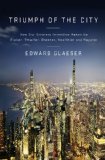Triumph of the City
Released February 10th, 2011, Triumph of the City is the latest book to examine the value of cities. Written by Ed Glaseser, an economist at Harvard, the book explores “How Our Greatest Invention Makes Us Richer, Smarter, Greener, Healthier, and Happier.” Dwelling largely on the social aspects of cities, Glaeser walks through the various aspects of city life that enable cities to succeed or fail including public health, public education, and transportation. He walks through evidence-based examples of why cities work to increase their residents wealth and health, examining the spread of ideas and disease as well.
Assembling years of research into a coherent story is no small task, and Ed Glaeser does a pretty good job at it. Triumph of the City is fairly data-heavy, but none of the data requires a degree in economics to understand. Glaeser also doesn’t draw heavily from charts or graphs, leaving most of the data to be weaved into the narrative.
Glaeser offers much praise and fair criticism of Jane Jacobs and her famous book The Death and Life of Great American Cities. Given that he references arguably the most famous urbanism book of all time, it’s inevitable that comparisons between the two are drawn. The Death and Life of Great American Cities, originally published in 1961, isn’t exactly timeless, but continuous, countless references to the ideas on vibrant cities expressed in the book make it still relevant. Triumph on the City doesn’t have the timeless feel that The Death and Life does, largely because of the immense amount of time-sensitive data it presents. Why does this matter? Triumph of the City is a book worth reading now, but it likely won’t be in ten to twenty years (at least without significant revisions).
If you wanted to read a book about cities today, read Triumph of the City. It’s about the era in which we live, and how we got here. It’s about how we’re going to move forward from today. It’s well-researched arguments on the value of cities are a welcome change from partisan bickering, and it offers a number of thought-provoking points that will hopefully drive forward discussions on the future of man’s greatest invention.
I’ll end with a quote from Jon Stewart about the book – “If you live in a city, if you’re planning on living in a city, if you ever lived in a city-this is a great book to read to give yourself a nice feeling of what you’re accomplishing. It’s a tremendous book.”






















